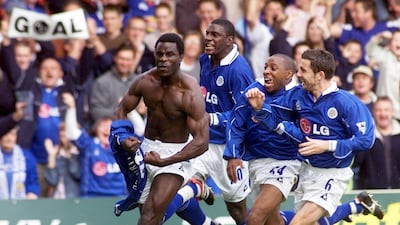This weekend I saw Ade Akinbiyi. Not literally but he was definitely there, a blur in the celebrations of Radamel Falcao and Luis Suarez, both of whom finally broke scoreless streaks that otherwise were tilting their worlds off-centre.
Premier League fans of a certain age are unlikely to have forgotten Akinbiyi, the man responsible for one of the greatest goal celebrations.
It is probably among the most identifiable images of the Premier League, alongside Tony Yeboah’s goal, Eric Cantona’s assault at Crystal Palace and David Beckham’s introduction to the wider world by way of a goal from his own half.
Akinbiyi’s was not much of a goal, against Sunderland in November 2001 and, in normal circumstances, it would probably not have produced the celebration it did.
A scuffed first attempt blocked, a scuffed attempt on the rebound dribbling its way in.
It captured the haplessness of Akinbiyi at the time, on the wrong end of a 15-game run without a goal. That was, incidentally, his second 15-game spell in the Premier League without a goal, the first coming for Norwich in 1993/94.
Leicester had bought him for £5 million (Dh28.6m) in 2000, as replacement for Emile Heskey. Yet all through his spell, Akinbiyi played as if he were Atlas and that price tag the world on his shoulders.
A game against Liverpool two weeks before the Sunderland goal was the abyss, Akinbiyi missing four astonishingly simple chances.
His fans were on his back, his side had hit bottom, the manager who bought him had been sacked and the new man was, well, not 100 per cent convinced.
“Whether he is just having a bad time or hasn’t quite got the quality,” was the start of Dave Bassett’s less-than-encouraging assessment of Akinbiyi after the Liverpool game.
So the celebration was immense. It had to be.
I know its every step without recourse to YouTube, him steaming towards the touchline and then all the way up it.
He took his shirt off as he ran, flexing a magnificent upper body as if he had confused a 100-metre sprint with a bodybuilding contest.
It had in it a wide spectrum of emotion.
Bravado, vindication, anger, delirium and above all, relief, that he was a striker and he had scored a goal.
It is not surprising he wanted to be alone in that celebration, not letting his teammates catch him. It was an exorcism and, in a team game, a full stadium and in front of TV cameras, a moment of solitude.
I am pretty sure I saw glimpses of that in Falcao’s sprint towards the corner flag once he had levelled for Manchester United on the weekend.
Not to the same maniacal degree because Falcao was not in the same kind of drought.
He last scored on October 5 and injuries have limited his on-field presence to only 126 minutes since. This was only his second start. Moreover, he is a champion, elite-level scorer who was bound to come good.
Akinbiyi? Not so much.
But that is the point. Not scoring goals for a stretch is the great equaliser.
That is why the ghost of Akinbiyi was there, the ghost that spooks all strikers, a nightmare no forward wants for even his rival. Even Ronaldo might not wish it upon Messi.
There is no predicament as tortured in football as the non-scoring centre forward.
The way matches and performances are analysed and measured has expanded drastically in recent years.
All kinds of data are available and more is used than ever before. But in many ways, the two starkest, most revealing and cruellest statistics remain those for the striker and goalkeeper.
Those two are ultimately judged by how many one concedes and how many the other scores. Beyond that the game is irreducible.
If a team scores more than it concedes in every game, it wins every game, every title.
Admittedly, centre forwards are no longer what they used to be. The position is evolving into a more complex role.
Football is changing. Some sides play and succeed without a conventional forward.
Like Barcelona, for whom Suarez broke a league drought. Maybe because it is Barcelona it matters less, but it does really.
“I am a forward and I must score goals,” Suarez said. “But I am helping the team to achieve things, which means I was not obsessed about this.”
Really? Not obsessed, like not having issues with biting opponents?
Because a striker not scoring goals in 1927 is the same as a striker not scoring in 2015, and will be the same as one not scoring in 3017: it will always be a problem.
osamiuddin@thenational.ae
Follow us on Twitter at SprtNationalUAE

